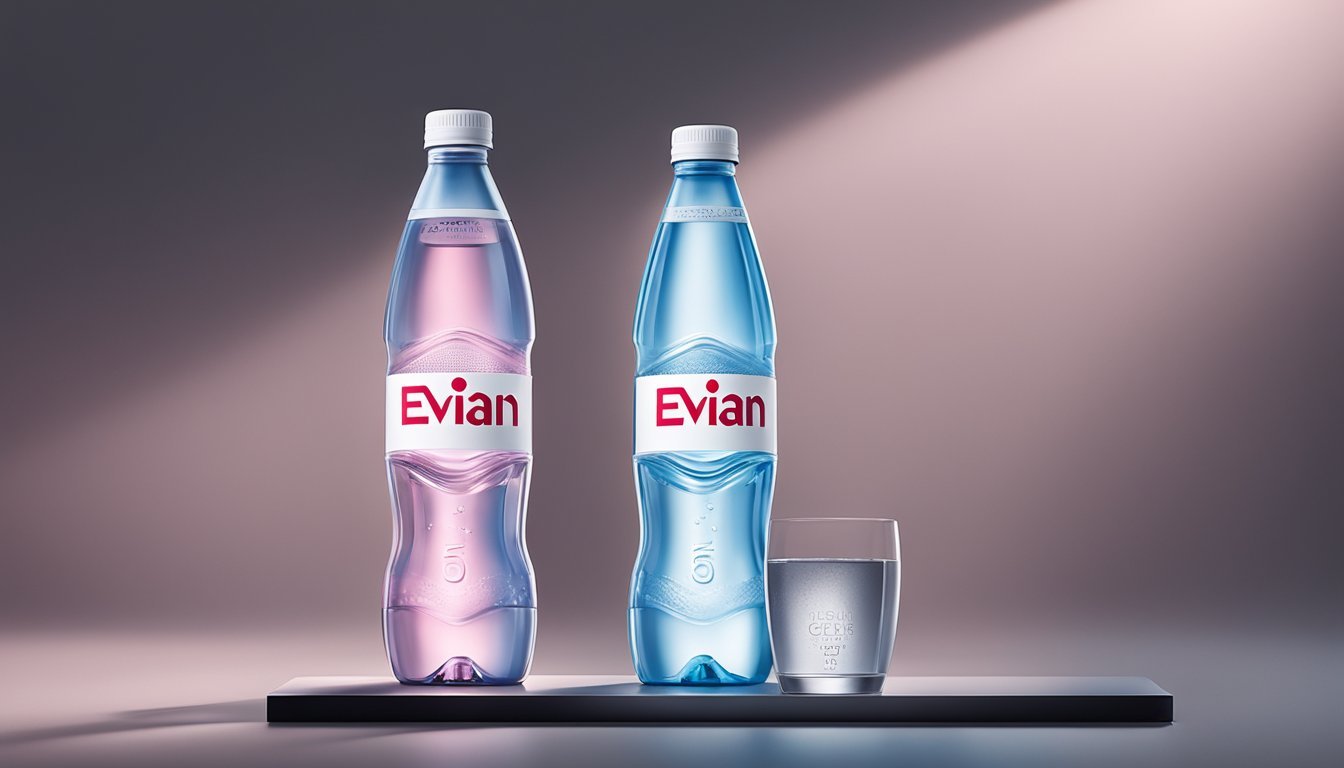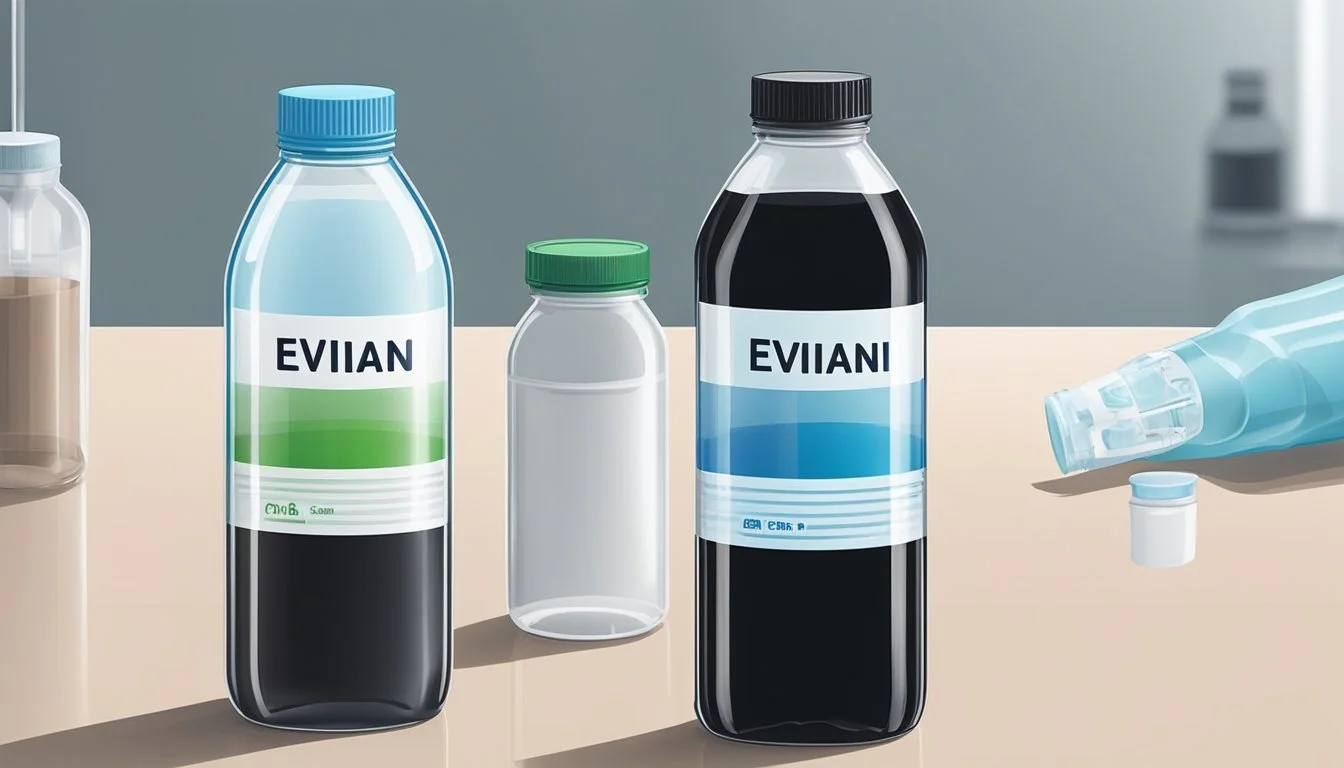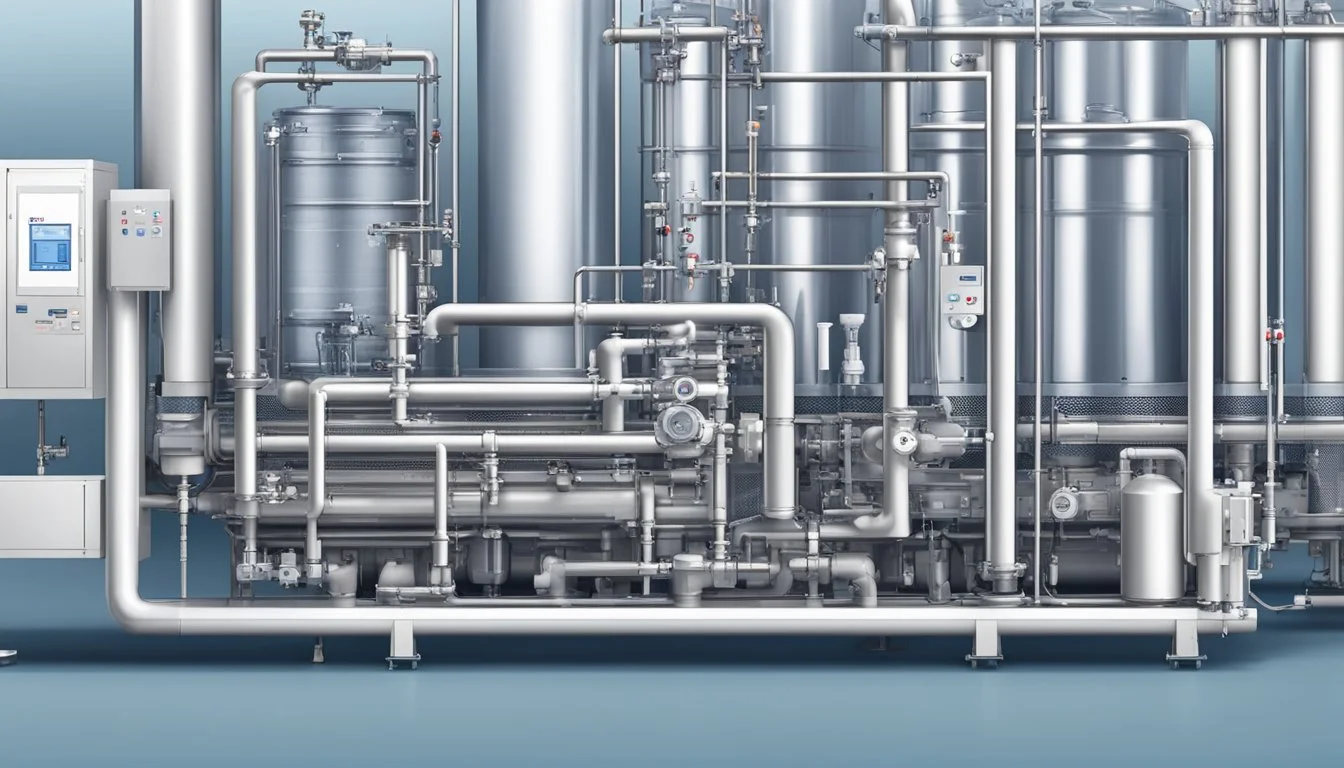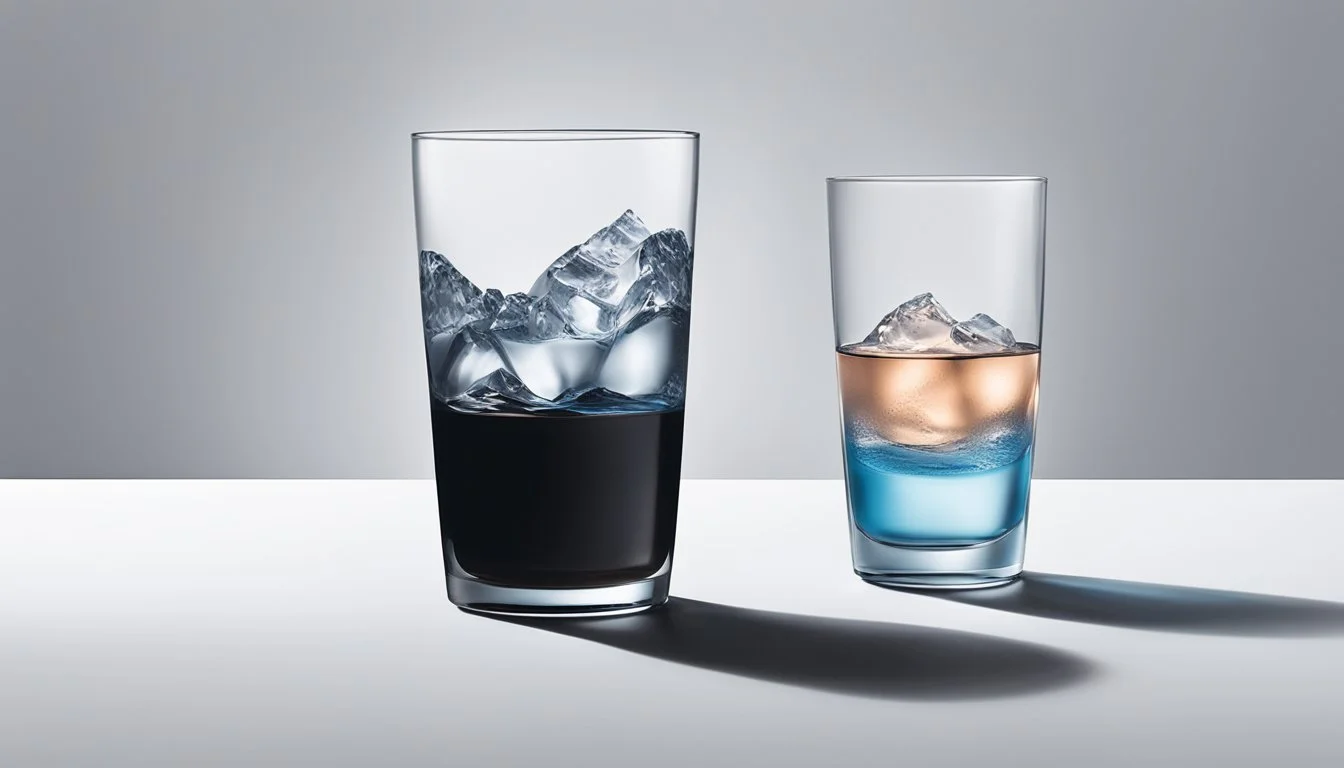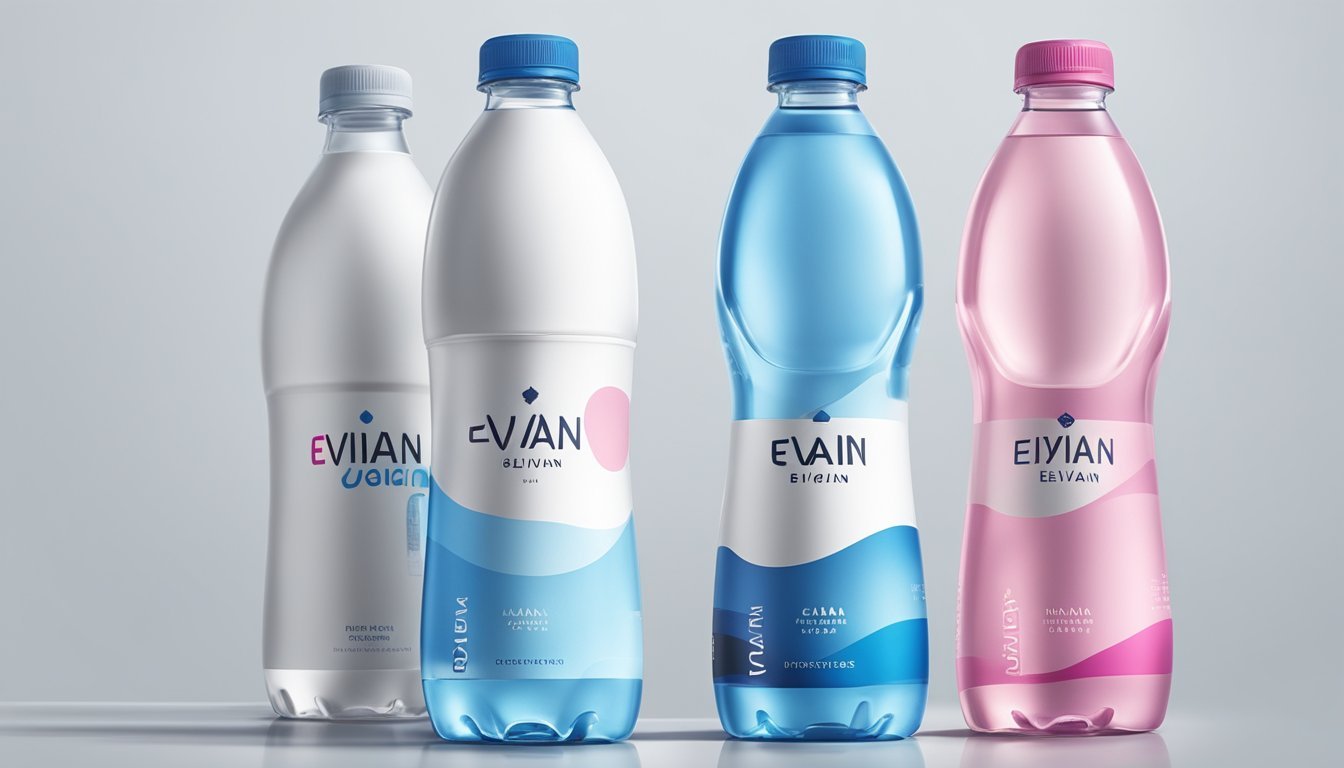Evian vs. Blk
Which Bottled Water is Better and Why
When it comes to premium bottled water, Evian and Blk are two brands that often come up in conversation. Both offer unique qualities that appeal to different types of consumers. Evian, sourced from the French Alps, is known for its crisp, clean taste and balanced mineral content. Blk, on the other hand, stands out for its distinctive black hue, derived from fulvic minerals which are claimed to offer various health benefits.
For those seeking a water with a pure, refreshing taste, Evian is often considered superior. Its natural filtration through glacial rocks ensures high quality and purity, making it a favorite among health enthusiasts and everyday drinkers alike. The taste profile of Evian is smooth and consistently praised for its light and refreshing feel.
Blk might appeal more to those interested in trendy, fitness-focused lifestyles. The unique fulvic-infused water boasts a range of claimed health benefits and has a bold appearance that sets it apart on store shelves. While its taste can be unusual due to the mineral content, it attracts a niche market looking for potential wellness boosts and a visually striking product.
Comparing Sources of Water
Evian and Blk offer distinct sourcing origins that contribute significantly to their unique qualities. The natural spring origin of Evian contrasts with the trace mineral enrichment of Blk, making each appealing to different consumer preferences.
Evian: Sourced from the French Alps
Evian water originates from the pristine French Alps. Sourced from an underground spring known for its purity, it undergoes a natural filtering process through layers of glacial sand, which take over 15 years.
This natural filtration imbues the water with a balanced mineral content, including calcium and magnesium. The source is located near Évian-les-Bains, a region famed for its natural spring water. The consistent quality and purity of the water are strictly monitored to ensure that each bottle maintains its high standards.
Blk: Unique Fulvic Trace Mineral Enriched
Blk water stands out due to its unique enrichment with fulvic trace minerals. The water's source is also an underground spring, but it undergoes a proprietary process where these minerals are added.
These minerals give Blk water its distinctive black appearance. Fulvic minerals are believed to offer several health benefits, such as aiding nutrient absorption. This sets Blk apart from conventional bottled waters that do not contain such enhancements.
While its origin as a natural spring is important, it's the additional enrichment process that defines Blk's uniqueness. The trace minerals significantly influence the water's taste and perceived health benefits.
Examination of Water Quality and Purity
Evian and Blk bottled waters offer distinct profiles in terms of mineral content, health benefits, and safety standards. Understanding these differences can help consumers make an informed decision.
Mineral Content and Health Benefits
Evian water originates from the French Alps and contains a range of minerals such as calcium and magnesium. Specifically, it has approximately 80 mg/L of calcium and 26 mg/L of magnesium, resulting in a balanced, mineral-rich profile. These minerals can support bone health and muscle function.
Blk water, in contrast, is infused with fulvic acid, which contributes its unique black color. Fulvic acid offers trace minerals and antioxidants, which some claim promote digestive health and nutrient absorption. However, its mineral content and specific health benefits are less well-documented compared to Evian’s established profile.
Assessment of Contaminants and Safety Standards
Evian adheres to strict quality standards, undergoing regular testing for contaminants. Its purity is ensured by natural filtration through glacial rocks, and it meets EPA regulations. Evian also avoids issues related to BPA, as their bottles are BPA-free.
Blk water also maintains a commitment to safety, with the company adhering to FDA and EPA guidelines. Both brands require third-party testing to confirm the absence of harmful contaminants like PFAS chemicals. Consumers can trust that both Evian and Blk prioritize water safety and maintain high-quality assurance practices.
Comparing these two brands reveals their distinct mineral profiles and rigorous safety standards, ultimately catering to different preferences and health considerations.
Understanding the Filtration and Bottling Processes
The filtration and bottling processes are vital in determining the quality and safety of bottled water. Evian and Blk employ distinct methods influenced by their unique sources and technological approaches. Analyzing these processes provides insight into their commitment to quality, health impact, and environmental sustainability.
Evian's Filtration Journey
Evian water undergoes a natural filtration process that takes place over 15 years. The water starts as rain and snow in the French Alps and makes its way through layers of glacial sand. This process naturally filters the water, enriching it with minerals such as calcium and magnesium.
The collected water is tested for purity and bottled without undergoing any additional treatment, preserving its mineral-rich, alkaline properties. Evian uses recycled plastic bottles, emphasizing its commitment to sustainability and reducing environmental impact.
Blk's Technological Distinction
Blk water is infused with fulvic acid, giving it a unique black hue. Fulvic acid is sourced from ancient plant matter found deep in the earth. This compound is said to enrich the water with over 77 minerals and electrolytes.
To ensure purity, Blk water undergoes a rigorous carbon filtration process, followed by ultraviolet light treatment to eliminate any potential contaminants. This modern filtration ensures the water retains its signature minerals while maintaining safety standards.
Bottling: Sustainability and Health Impact
Evian prioritizes sustainability in bottling, utilizing bottles made from 100% recycled plastic. Their facilities aim to reduce their carbon footprint and promote environmentally friendly practices. Glass bottles are also an option, catering to consumers seeking an alternative to plastic.
Blk also shows a commitment to the environment by using BPA-free plastic bottles and exploring recyclable materials. Both brands aim to minimize their environmental impact while delivering high-quality water. The added minerals in Blk water may contribute to various health benefits, whereas Evian's natural minerals support hydration and overall health. Both approaches underscore a dedication to consumer health and environmental responsibility.
Tasting Notes: Flavor Profiles of Evian and Blk
Evian and Blk offer unique and distinctly different taste experiences. While Evian is known for its clean and balanced flavor, Blk stands out due to its infusion of minerals that impart a unique taste.
The Subtleties of Evian's Taste
Evian is valued for its smooth and clean taste that lacks strong mineral aftertastes. Sourced from the French Alps, it contains balanced electrolytes, contributing to its refreshing and hydrating qualities. The water has a subtle mineral flavor that is often described as neutral and crisp, appealing to those who prefer pure-tasting water. The texture is typically smooth, making it easy to drink and ideal for daily hydration.
The Distinct Flavor of Blk Water
Blk water is characterized by its distinct black color due to the infusion of fulvic minerals. These added minerals create a unique flavor profile that is slightly earthy with a hint of natural minerals. While it may initially appear unconventional, Blk provides ample hydration and a different taste experience compared to traditional bottled waters. The presence of electrolytes enhances its refreshing attributes, making it a favorite for those looking for more than just plain water in their hydration routine.
Evian offers a classic, pure flavor, while Blk provides a mineral-rich, distinct experience, catering to varying preferences in bottled water.
Comparative Analysis of Hydration Effectiveness
Evian and Blk offer distinct hydration experiences based on their electrolytes and pH levels. Understanding these aspects can help determine which water might better support one's hydration needs.
Electrolyte Levels and Hydration
Evian is sourced from the French Alps and is recognized for its natural mineral composition. It contains essential minerals like calcium, magnesium, and potassium, which contribute to electrolyte balance and efficient hydration.
Blk water is infused with fulvic minerals, which are believed to aid in the transport and absorption of nutrients. These minerals not only provide hydration but may also enhance cellular functions due to their trace elements.
While Evian provides a consistent and traditional source of electrolytes, Blk offers a unique approach to hydration with its additional fulvic content. Both waters cater to those looking for effective hydration but in different ways—Evian through its balanced mineral profile and Blk through its enhanced fulvic mineral content.
pH Balance and Drinkability
Evian's pH level is slightly alkaline, typically around 7.2. This slight alkalinity can aid in neutralizing acidity in the body, contributing to a smoother and potentially more refreshing drink.
Blk water, on the other hand, has a more neutral pH level, usually hovering around 7.0. The fulvic minerals infused in Blk do not significantly alter its pH but provide a unique taste profile.
In terms of drinkability, Evian’s slight alkalinity and mineral content offer a crisp taste that many find refreshing and smooth. Blk's neutral pH, combined with its unique mineral infusion, gives it a distinctive flavor that some consumers may prefer.
Both waters offer effective hydration, but their differences in pH and mineral content might appeal to different taste preferences and hydration requirements.
Health Implications and Nutritional Value
Comparing Evian and Blk bottled waters requires a close examination of their mineral content and the potential health benefits they offer. Both brands have a balanced mineral composition but cater to different health needs.
Minerals and Body Function
Evian water is rich in calcium, magnesium, and potassium. These minerals are essential for various bodily functions. Calcium supports bone health and teeth.
Magnesium aids with muscle function and energy production.
Potassium helps maintain proper heart and muscle function.
Blk water, on the other hand, is infused with fulvic acid, which enhances nutrient absorption and may support cellular health.
Both waters offer important electrolytes, crucial for maintaining hydration levels.
A table to summarize mineral content:
Mineral Evian (mg/L) Blk (mg/L) Calcium 80 Varies Magnesium 26 Varies Potassium 1 Varies Fulvic Acid N/A Present
Potential Health Conditions Relieved by Hydration
Proper hydration helps alleviate several health conditions.
Evian's mineral-rich profile can assist in digestion and prevent dehydration-related issues.
Adequate consumption may reduce constipation and aid in smooth digestion due to the presence of magnesium and bicarbonate.
Blk's unique inclusion of fulvic acid supports detoxification and improved nutrient uptake.
Drinking enough water, whether Evian or Blk, helps maintain hydration, vital for physical performance, cognitive function, and overall well-being.
The anti-inflammatory properties provided by these minerals can relieve mild dehydration symptoms and improve general health.
Market Comparison with Other Bottled Waters
When comparing Evian and Blk to other popular bottled water brands, it's crucial to understand how they stack up against both high-end and mass market options, as well as eco-friendly alternatives.
High-End Options: Fiji, Voss, and Essentia
Fiji water is renowned for its natural artesian source and pH balance of 6.96. It’s characterized by a smooth taste and high silica content which many claim gives it a unique mouthfeel. It appeals to consumers who are looking for a premium experience.
Voss, with its minimalist, cylindrical glass bottle, markets itself on purity and design. It’s sourced from an underground aquifer in Norway, with a low mineral content, which results in a clean and crisp taste profile.
Essentia offers ionized alkaline water with a pH of 9.5, which some believe helps in maintaining better hydration. It stands out for its rigorous purification process that includes reverse osmosis, making it a choice for health-conscious consumers.
Mass Market Brands: Aquafina, Dasani, and Pure Life
Aquafina, produced by PepsiCo, is purified through a rigorous process using reverse osmosis, guaranteeing a clean and consistent taste. It's ubiquitous and competitively priced, making it a popular option among mass-market consumers.
Dasani, from Coca-Cola, is another widely available brand. Known for adding minerals to create a slight taste profile, Dasani also uses a purification process that ensures the water meets high safety standards.
Pure Life, a Nestlé product, offers competitively priced bottled water sourced from wells or municipal supplies, then purified. It is geared towards everyday hydration needs, with a strong focus on affordability and availability.
Eco-Friendly and Innovative Alternatives
Boxed Water markets itself as a more sustainable option, using recyclable and biodegradable cartons instead of plastic bottles. It aims to reduce plastic waste and appeal to environmentally conscious consumers.
S'well offers reusable bottles with an emphasis on design and insulation properties. This brand targets consumers who prefer to fill their bottles with filtered water from home, reducing single-use plastic consumption.
Flow alkaline spring water, packaged in eco-friendly packaging, is another innovative option. It combines both environmental sustainability with premium water quality, aiming to deliver on both taste and ethical consumption.
Evian and Blk find themselves in a diverse market landscape where high-end, mass-market, and eco-friendly options all have their own unique selling points.
Industry Insights: The Business of Bottled Water
The bottled water industry is a rapidly growing market, driven by evolving consumer trends and strategic branding efforts by major companies. It is essential to understand how brands differentiate themselves and capture consumer attention.
Consumer Trends and Preferences
Consumer preferences in bottled water are heavily influenced by health consciousness and environmental concerns. The demand for BPA-free plastic bottles is rising, reflecting a shift towards healthier lifestyles. San Pellegrino and Acqua Panna offer options that cater to these preferences.
Additionally, there is a growing interest in niche products like mineral-rich Evian and Icelandic Glacial, which boast unique sources. Carbonation and sparkling water varieties are also becoming popular, with San Pellegrino and Flow leading this segment.
Consumers prefer products that promise purity and safety, which drives higher sales of brands perceived as higher quality or sourced from pristine locations.
Branding and Market Positioning
Branding strategies are crucial in differentiating bottled water brands in this competitive market. Leading brands like Dasani (by Coca-Cola), Evian, and San Pellegrino leverage their global recognition and premium positioning to attract consumers.
Evian emphasizes its source in the French Alps, while Blk markets its unique black-colored water due to its high mineral content.
Aquafina and Dasani dominate through extensive distribution networks and aggressive marketing campaigns. Brands often highlight their environmental efforts, such as using recyclable or eco-friendly packaging, to appeal to eco-conscious consumers.
Effective market positioning helps capture both health-oriented and environmentally conscious segments, ensuring sustained growth in sales.
Environmental Impact and The Future of Bottling
Evian and Blk are both major players in the bottled water industry, facing scrutiny over their environmental practices. This section explores their use of plastic, waste reduction initiatives, and innovations in packaging and recycling.
Plastic Use and Waste Reduction Efforts
Plastic bottles remain a significant concern due to their environmental impact. Evian has pledged to use only recycled PET (rPET) by 2025, currently incorporating an average of 44% rPET in its bottles. This effort reduces carbon emissions by 30% compared to virgin PET. Such initiatives are part of a broader strategy to minimize plastic waste and emphasize circular economy practices.
Blk, on the other hand, is also exploring measures to reduce its reliance on plastic. Both brands recognize the urgent need to find sustainable alternatives and enhance recycling programs. They aim to reduce their carbon footprint and lower the environmental toll of plastic production. Additionally, efforts to educate consumers about responsible disposal and recycling play a crucial role in waste reduction.
Innovations in Packaging and Recycling
In response to environmental concerns, both Evian and Blk are investing in innovative packaging solutions. Evian is exploring biodegradable and compostable materials, aiming to revolutionize the industry with eco-friendly options. Glass bottles are also under consideration as they offer a reusable alternative to plastic.
Recycling is another focal point, with both brands advocating for improved recycling infrastructure and consumer participation. Blk emphasizes the development of more efficient recycling processes to ensure that their packaging materials can be reused multiple times. These innovations are crucial for reducing the overall environmental impact and promoting sustainability within the bottled water industry.
In conclusion, addressing plastic use and waste reduction, alongside innovations in packaging and recycling, is essential for the future of bottling. Both Evian and Blk are actively working towards more sustainable practices to mitigate their environmental impact.
More About Evian
Evian vs Mountain Valley Spring Water: Which Bottled Water is Better?
Evian vs Richard's Rainwater: Which Bottled Water is Better?
Evian vs Whole Foods Italian Still Mineral water: Which Bottled Water is Better?

